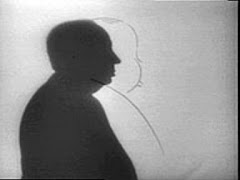Film Studies For Free actively espouses the ethos of Open Access to digital scholarly material. It aims to promote good quality, online, film and moving-image studies resources by commenting on them, and by linking to them. These resources will include published scholarship or research in various forms: from film and media weblogs, through online peer-reviewed journals, to other forms of web-based scholarly writing, as well as online works of film/moving-image research by practice.
I won't cross-post between different blogs normally (my vanity-publishing does have some limits...), but the content of the first post to FSFF could have happily resided on Directing Cinema, so here's the full text:
"Three very worthwhile items on the concept of the Director's Cut, of clear interest (inter alia) to researchers of film authorship like me, have appeared recently, in two regularly excellent online resources. First, Jonathan Rosenbaum's increasingly unmissable website carried an article of his on 'The Perils of the Director's Cut' that recently appeared in French translation in Le Mythe du Director’s cut (Paris: Presses Sorbonne Nouvelle, 2008), a collection coedited by Michel Marie and François Thomas, and was also adapted from a lecture he gave at a conference about 'Directors’ cuts' that was held at the Toulouse Cinémathèque in early 2007.
Rosenbaum attempts to distinguish between 'aesthetic and business ways' of dealing with Director's Cuts, and in so doing he also broaches some useful ontological questions more generally. He concludes the bulk of his discussion with Ridley Scott's comment about the 1992 'director's cut' version of his film Blade Runner: “The so-called Director’s Cut isn’t, really. But it’s close. And at least I got my unicorn.” To this, Rosenbaum adds:
Scott’s philosophical acceptance of this version as “close” significantly resembles the usual position of publicists regarding such matters–which is that in the final analysis, chaque film a deux versions, une version correcte et une version plus correcte [each film has two versions: a correct one and a more correct one]. The notion that any version might be incorrect is one that belongs to history and aesthetics, but not to business.
Rosenbaum notes, in his online introductory blurb, that while his article examines the first two versions of Blade Runner (1982 and 1992), it was written prior to the release of Blade Runner: The Final Cut. Ridley Scott's multiple versions are the subject of another useful and provocative meditation on the Director's Cut (published by the online Bright Lights Film Journal) by Erich Kuersten. In his article, Kuersten alights upon what may become quite common forms of film 'replicanting' in this age of exaggerated hypertextuality and concludes thus:
If Orson Welles was working today, I wonder how many different versions of Touch of Evil or Citizen Kane there would be? Perhaps what was once considered indecision and fussiness will soon be a strength — as hypertextuality and increased bandwidth continue to dissolve the boundaries between memory and "reality," the finished and the forever open, the retro and the futuristic, and the impossibility of a cut ever being truly "final."In the same issue of Bright Lights (no.61), in which a number of other pieces on film remaking and revisioning appear (incuding an interesting look at Michael Haneke's two versions of Funny Games, 1997 and 2007-8), Jason Martin Scott discusses John Cassavetes re-editing of his 1976 film The Killing of a Chinese Bookie and the release of his new version two years later. In his article, 'A Real Director's Cut', Scott argues that the fact that Cassavetes was prepared, very unusually for the time, to re-edit an already released film is indicative of his determination to change direction at this point in his work:
the re-edited Bookie is the most fully realized of all Cassavetes' films, and a viewing of both it and its prototype provides a rare opportunity to witness a great director's substantive and formal evolution in the making.
I'd be very interested to hear of any more useful online references to the director's cut and to film 'revisionings' and 're-versionings' more generally."






